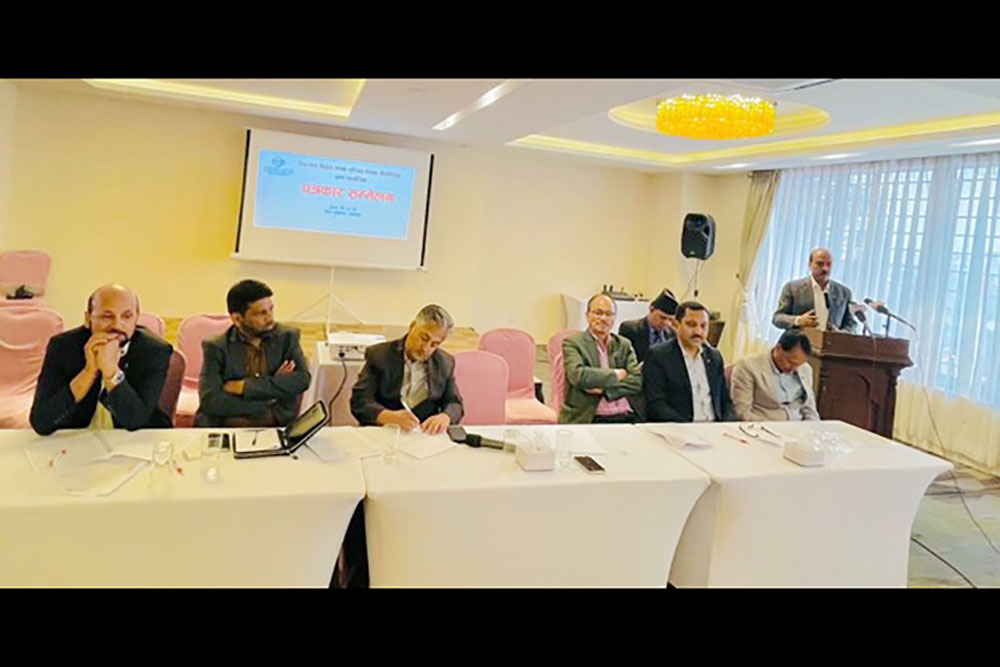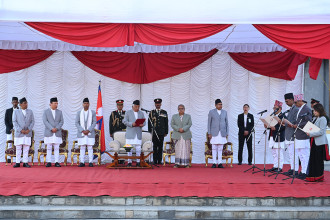
KATHMANDU: A delegation of the Confederation of Commercial Banks and Financial Institutions Nepal (CBFIN) on Monday met with Prime Minister Pushpa Kamal Dahal and held a discussion on the current economic and banking situation and reforms of the country.
The delegation headed by CBFIN President Pawan Kumar Golyan raised the issue of increasing chaotic activities and violent attacks on employees of banks and financial institutions (BFIs) and reducing the interest rates and held the opinion that the government should take priority in such matters.
At the meeting held in the presence of the Finance Minister, Chief Secretary, Nepal Rastra Bank (NRB) Governor, Home Secretary and Finance Secretary at the Office of the Prime Minister and Council of Ministers (OPMCM), they intensively discussed the current economic and banking situation of the country and the possible measures for improvement, the press statement issued by the CBFIN said.
The representatives of the umbrella organisation of commercial banks, development banks, and finance companies, submitted suggestions to the Prime Minister.
At the meeting, the delegation suggested increasing capital expenditure, increasing income tax or customs rate on imported goods and luxury goods to increase revenue, and reducing the corporate income tax rate of banks from 30% to 25%.
They further suggested the central bank ensure sufficient liquidity in the banking system to prevent lack of investable funds, control fluctuations and maintain interest rate stability.
For the expansion of access to credit, they suggested increasing employment and production, and added Working Capital Guidelines should not be made applicable for loans up to Rs 50 million disbursed to micro, small and medium enterprises to replace imports.
The interest rate on loans required for the productive sector and employment-generating industries and business, energy, construction, tourism, and agriculture should have differences by at least 2% compared to other sectors.
In response, PM Dahal informed that the government is looking for various measures to reduce the interest rate of banks and will come to a conclusion soon. He said that the government is serious about improving the overall economy while reducing the pressure on the economy. He informed that the government is doing homework to make the real estate business organised.
He opined that the challenges and pressures of the economy could take a positive direction only through the cooperation between the government and private sector. Further, he said a comprehensive discussion will be held with the representatives of the private sector and government bodies before making the budget.
PM Dahal said the government is sensitive to the illegal activities going on against BFIs. He said no exemption will be given to those taking bank loans and not paying. The government will proceed with the task according to the requests of BFIs regarding the safety of banks and employees, the Prime Minister said.
On the occasion, Finance Minister Prakash Sharan Mahat said that he is holding discussions with Nepal Rastra Bank for the improvement of the overall economic system including the adjustment of the interest rate. The issue of proper management of capital expenditure and increasing investment in the productive sector, and finding an appropriate solution to the problems seen in the stock market are also being seriously discussed, he informed.
Similarly, NRB Governor Maha Prasad Adhikari said the central bank is preparing to adjust the interest rates of deposits and loans.
Likewise, Home Secretary Binod Prakash Singh said that he has instructed all the district administration offices to identify, control and take action against illegal activities and attacks on BFIs.
READ ALSO:
The representatives of CBFIN criticised violent attacks carried out by individuals and groups on BFIs and the employees engaged in for the past few days and said such illegal activities have created serious and challenging situations for the banking and financial sector as well as the entire economy. They further suggested the government issue directive to the district administration offices and security agencies across the country to take strict measures to ensure the environment conducive to providing banking services without interruption and to immediately arrest and take legal action against anyone involved in such activities.
No environment for investment despite fund availability: CBFIN President Golyan
Meanwhile, at a press conference organised by CBFIN in Lalitpur on Tuesday, CBFIN President Golyan said there was no investment-friendly environment in the country despite the availability of liquidity in banks and financial institutions.
He said the financial institutions were afraid of flowing new investments despite having adequate deposits in banks. "BFIs staff are not assured that loan invested in different sectors will be paid back".
He urged the media to raise the issue that it was wrong to create an environment for not to repay loans in an organised manner. "The interest rate charged for the productive sector should be low than the interest rates for the unproductive sector". "The fear of reducing the interest rate was to check the flight of money for purchasing luxurious goods. But, the BFIs received a huge amount of deposits due to higher interest rates.
On the other hand, entrepreneurs are not in a position to bear the existing interest rates. Therefore, interest rates should be lowered, he noted.
There was an investment of Rs 200 billion in small hydropower-based energy sector from banks, he said, stressing the need to formulate policy taking into consideration the chance for leveraging economic prosperity.
CBFIN secretary Pushpa Sharan Mallik said the BFIs should discourage fixed deposits below one year so as to reduce interest rates. "There should be low cost for reducing interest rates. So, it needs to discourage receiving fixed deposit for less than a year".
On the occasion, Golyan said the interest rates should be lowered effective from the coming mid-April since the entrepreneurs are not being able to pay back the interest rates of the loan and bear the burgeoning loan portfolio.
Published Date: April 12, 2023, 12:00 am
Post Comment
E-Magazine
RELATED B360 National





-1765524551.jpeg)